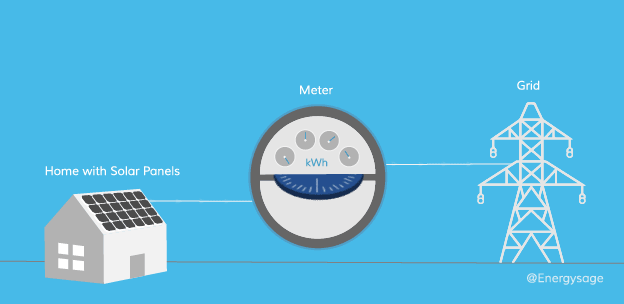Last updated 7/15/2020
What is net metering?
Net metering (also known as net energy metering or NEM) is a solar incentive that allows you to store energy in the electric grid. When your solar panels produce more electricity than you need, that energy is sent to the grid in exchange for credits. Then, at night or other times when your solar panels are underproducing, you pull energy from the grid and use these credits to offset the costs of that energy.
With the right size solar energy system, you can produce enough electricity to match your home’s electricity use for the entire year. However, the amount of electricity your solar panels produce will vary throughout the year. Net metering helps you account for these differences by crediting you for the excess electricity your panels produce so you can use it later.
While net metering is not the only way that utilities compensate homeowners for going solar, it is by far the most common: as of 2016, 41 states and Washington D.C. have mandatory net metering rules, and two more have utilities that permit the practice. To find out the policies in your state, use the Database of State Incentives for Renewables and Efficiency (DSIRE®), which tracks net metering and other policies.


“Net metering can give you a new monthly paycheck”
Fact or Fiction?

FICTION.
With net metering, you can receive utility bill credits for the electricity that your solar panels produce. However, you won’t receive a cash payment from your utility for your excess solar electricity, no matter how much you generate. If you do generate more electricity than you use in a year, utilities in some states will let you carry credits over into future years, while others will reduce your credits.
In general, most homes will produce excess electricity in the summer months and will use more electricity from the grid in the winter. Because these variations in production are fairly predictable, your utility won’t send you a monthly check when you produce more than you need. Instead, you will build up extra credits during the summer months so that you can draw from them at night and during the winter months when you need them. With the right design, your system can generate enough power to match your total electricity use for a year.
How net metering works
Solar energy systems typically hit peak electricity production in the afternoon, when many people aren’t home using electricity. By contrast, home electricity use is typically higher in the mornings and evenings. Net metering helps you to account for these ups and downs in your day-to-day electricity production and usage.
With net metering, excess electricity is fed into your electric utility’s grid when your system is producing more than you need. When this happens, your meter actually runs in reverse. When your system isn’t producing enough electricity, you can draw it from your utility just as you did before you went solar. This “back-and-forth” between your system and the grid ensures that your excess production will still be used and your shortages will be met. With net metering, the excess electricity your home produces covers the times when you don’t produce enough.
When your solar power system generates more electricity than you use over the course of a month, your utility bill will receive a credit based on the net number of kilowatt-hours you gave back to the grid. If you produce less electricity than you use in a given month, you must buy electricity from your utility to make up the difference. In these instances, you would pay for the electricity you use, minus any excess electricity your solar panels generated.

What about going off the grid?
In essence, net metering is like having the grid serve as a giant solar battery. If you install an energy storage system to take your home “off the grid,” you won’t have access to the benefits of net metering. In most cases, staying connected to the electric grid is your best option – while home solar battery systems can account for hour-by-hour variations in solar electricity generation, they aren’t large enough to provide the seasonal “smoothing” benefits of net metering.
With net metering, you can save by going solar
Thanks to net metering, homeowners are credited for the energy that their solar panels generate at the same rate that they would pay to their utility. As a result, you can save tens of thousands of dollars on electricity costs over the lifetime of your solar energy system. Calculate your solar savings to get an instant estimate of just how much you can save with a solar energy system, or register your property to start getting quotes from local solar installers.
Net metering in your state
| State | Net Metering? | Alternative Policy? |
|---|---|---|
| Alabama | No | No |
| Alaska | Yes | No |
| Arizona | Yes | No |
| Arkansas | Yes | No |
| California | Yes | No |
| Colorado | Yes | No |
| Connecticut | Yes | No |
| Delaware | Yes | No |
| District of Columbia | Yes | No |
| Florida | Yes | No |
| Georgia | No | Yes |
| Hawaii | No | Yes |
| Idaho | Yes* | No |
| Illinois | Yes | No |
| Indiana | Yes | No |
| Iowa | Yes | No |
| Kansas | Yes | No |
| Kentucky | Yes | No |
| Louisiana | Yes | No |
| Maine | Yes | No |
| Maryland | Yes | No |
| Massachusetts | Yes | No |
| Michigan | Yes | No |
| Minnesota | Yes | No |
| Mississippi | No | Yes |
| Missouri | Yes | No |
| Montana | Yes | No |
| Nebraska | Yes | No |
| Nevada | No | Yes |
| New Hampshire | Yes | No |
| New Jersey | Yes | No |
| New Mexico | Yes | No |
| New York | Yes | No |
| North Carolina | Yes | No |
| North Dakota | Yes | No |
| Ohio | Yes | No |
| Oklahoma | Yes | No |
| Oregon | Yes | No |
| Pennsylvania | Yes | No |
| Rhode Island | Yes | Yes |
| South Carolina | Yes | No |
| South Dakota | No | No |
| Tennessee | No | No |
| Texas | Yes* | No |
| Utah | Yes | No |
| Vermont | Yes | No |
| Virginia | Yes | No |
| Washington | Yes | No |
| West Virginia | Yes | No |
| Wisconsin | Yes | No |
| Wyoming | Yes | No |
* Indicates that policy is not mandatory, but some utilities allow itStart your solar journey today with EnergySage
EnergySage is the nation’s online solar marketplace: when you sign up for a free account, we connect you with solar companies in your area, who compete for your business with custom solar quotes tailored to fit your needs. Over 10 million people come to EnergySage each year to learn about, shop for and invest in solar. Sign up today to see how much solar can save you.

